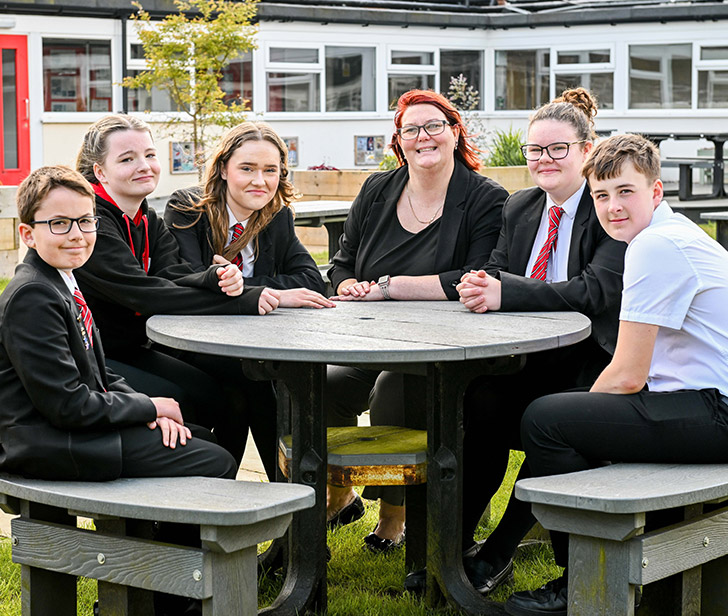Modern Languages
1. Rationale
As the UK is becoming an increasingly multicultural society, it is important that we provide our students with an understanding of other cultures and languages, freeing them from insularity and promoting diversity and tolerance. French and Spanish are global languages spoken across almost all continents of the world. The teaching and learning in lessons should ensure that students can understand and respond to speakers of the target language in both speech and writing. Pupils should also have the opportunity to communicate on a personal level and in every day transactions. Language teaching should enable students to gain the fundamental skills needed to build on their language knowledge as well as the skills to learn other languages, thus equipping them with the tools to study and work in other countries.
2. Aims — The curriculum for languages aims to ensure that all pupils
- understand and respond to spoken and written language from a variety of sources.
- are able to write for different purposes and different lengths, showing the variety of grammatical structures they have learnt.
- can speak with increasing fluency, continually improving their pronunciation and intonation.
- can discuss similarities and differences between their culture and that of target language countries.
3. The rationale for Sequencing
The sequencing of the MFL curriculum aims to help students understand and use a range of linguistic and grammatical skills as well as enhance their cultural knowledge. In lessons, we use a variety of receptive and communicative tasks to build on the key skills of reading, listening, writing and speaking. At Key Stage 3, students cover a variety of topics which enable them to communicate on a personal level and on a day to day basis. At Key Stage 4, if they opt for MFL, they students build on the foundations from Key Stage 3, widening their vocabulary and extending their knowledge of grammar. They study 8 topics which are broken down into manageable sections depending on the student's ability, and throughout which vocabulary and grammar are regularly reinforced, allowing them to become embedded in their long-term memory. Regular retrieval practice in starter activities ensures that students recap key vocabulary and grammar throughout the course.
4. Why?
Learning a language is a key ingredient in helping students to develop a greater understanding of the world around them and their place as a global citizen within it. Being able to communicate in more than one language is a life skill. Many students at our school have not yet had the opportunity to experience other cultures even beyond their own county, let alone another country. We encourage students to become interested in other cultures beyond their local area. They learn about different foods and drinks, festivals and celebrations, education systems, music, geographical features and famous people amongst other things, and they are encouraged to consider and express opinions on the similarities and differences between their lives and those in other cultures.
5. Research informing the Sequencing decisions.
Both Rosenshine's Principles of Instruction and Cognitive Load Theory have informed our curriculum sequencing and implementation. Both recognise the importance of memory in building schemas required to develop mastery and retention. Our schemes of work are sequenced so that students revisit skills and build upon prior learning over time, chunking more complex concepts into smaller parts. By limiting the amount of new information students are exposed to at one time, we can check understanding before moving the learning on. A scaffolded approach, combined with modelling and step by step success criteria means students are exposed to new skills and concepts gradually, building strong foundations and links across texts and skills.
6. Key Themes
| Key Theme | Overview |
|---|---|
| My personal world | To be able to introduce myself and my family, special celebrations to discuss friendships and relationships and to consider equality |
| Lifestyle and Wellbeing | To be able to discuss both physical and mental well-being, eating habits, sporting activities, illness and daily routines |
| My neighbourhood | To be able to describe places in a town, transport, the local environment and the natural world |
| Media and technology | To be able to give opinions and descriptions on TV, film and music, and to be able to discuss internet, gaming and social media use. To discuss celebrity culture |
| Studying and my future | To be able to discuss life at school and future employment, to think about hopes and aspirations |
| Travel and Tourism | To be able to discuss holidays, accommodation, access tourist attractions, key traditions and customs from French speaking countries, to be able to shop for items in a variety of locations, buy tickets |
Download — French 5-Year Learning Journey
Download — French Curriculum Overview
Download — Spanish 5-Year Learning Journey
Download — Spanish Curriculum Overview


